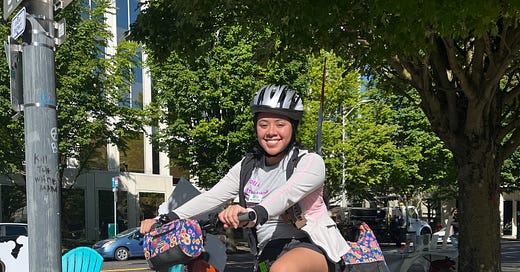Oregon Needs Sensible, Not Reactionary, E-Bike Policies
In this guest article, The Street Trust board member and policy lead for the Oregon Micromobility Network, Cameron Bennett lays out how we get safe, workable regulations for micromobility devices.
E-bikes are bikes. That simple truth should guide Oregon’s approach to micromobility policy, yet recent proposals threaten to saddle e-bikes with unnecessary restrictions, rather than advancing policies that make streets safer, expand mobility to the families that need it most, and improve enforcement where it actually matters.
Instead of reactionary regulations, Oregon must implement expert-driven policies developed by stakeholders across sectors — public agencies, industry leaders, and community advocates who understand the realities of how people move using small things with wheels, aka micromobility.
The regulatory focus should be on operator behavior and vehicle speed in shared spaces, and avoiding arbitrary restrictions based on vehicle type which are hard to discern, let alone enforce. The public has shown they are hungry for micromobility options. E-bike adoption is expected to put 77 million e-bikes on the world’s roads and paths by 2030.
We need clear, enforceable rules that ensure e-scooters and e-bikes remain accessible, while protecting riders and other road users from the risks of higher-speed motorcycles, mopeds, and illegally modified “e-bikes”.
Education, in this case, is more critical than regulation. Empowering riders and their families with knowledge and autonomy — through school programs, public information campaigns, and parental choice — will create safer streets for everyone.
To prioritize everyone’s safety, commercially-available devices should be vetted for regulatory compliance — rather than relying on riders to discern between real e-bikes and dangerous electric motorcycles falsely marketed as e-bikes. And for businesses, a dedicated regulatory framework for commercial e-bikes can ensure freight and delivery riders operate safely and efficiently, without burdening everyday users with unnecessary red tape.
Oregon needs to reclaim its role as a leader in transportation innovation. Let’s not fall behind with misguided, hard to enforce policies that punish the wrong people.
Let’s fully fund transportation safety and infrastructure programs like Safe Routes to Schools and build complete routes for Oregonians to travel safely and efficiently. Sensible, data-driven e-bike regulations will help Oregon families access affordable, low-carbon, and community-friendly micromobility options and create safe, shared streets for all. The choice is clear. Oregon must get this right.
About the Author: Cameron Bennett is a Transportation Analyst and consultant at Kittelson & Associates. A long-time transportation advocate and volunteer, he joined The Street Trust Board of Directors in 2024 and is the policy lead for the Oregon Micromobility Network (OMN).
More about the Oregon Micromobility Network and 2025 E-Bike Legislation
During the 2024 Oregon legislative session, The Street Trust worked on two e-bike bills: HB 4067 and HB 4103. HB 4067 would have created a task force on electric micromobility. While that bill had broad support, it stalled in the powerful Ways & Means committee due its $200,000 price tag.
Regardless, we pressed on, working with lawmakers, legislative leadership, and staff to help establish the Oregon Micromobility Work Group. Meeting several times over the summer of 2024, the group charted a course forward for a safety and regulatory framework for micromobility devices which, unlike HB 4103 (which we opposed), could pass in 2025.
We also worked to expand the former “E-bikes for All Working Group” to establish the Oregon Micromobility Network (OMN). OMN emerged from a workshop at The Street Trust’s 2024 Oregon Active Transportation Summit called “Debriefing the 2024 Session and Next Steps for E-Bike Legislation in Oregon.” Attended by dozens of stakeholders from across the state, the workshop covered building capacity and power to advance sensible, data-driven best practices and regulations.
OMN members represent local and state governments, shared system providers, academic institutions, nonprofits, transportation consultants, e-bike retailers and manufacturers, e-bike freight providers, advocacy organizations, and micromobility users. OMN is focused solely on cutting-edge micromobility issues as one of the leading groups of subject matter experts in North America.
This legislative session, OMN, The Street Trust, and our advocacy partners statewide will be tracking several pieces of e-bike and micromobility legislation. The bill we helped draft, “LC 713,” is currently making its way through the legislature. We’ll keep you updated on these bills’ progress as the session continues.
Join us at this year’s Oregon Active Transportation Summit
The first draft of the transportation package is scheduled to drop just before The Street Trust’s 2025 Oregon Active Transportation Summit (OATS), creating a pivotal opportunity for micromobility advocates, policymakers, and community leaders to convene and work together.
We hope you’ll join us to turn our shared goals into actionable solutions and help secure a transportation package and micromobility legislation that work for all Oregonians.
You can submit proposals here for workshops, presentations, panel discussions, mobile workshops, and study tours at OATS through February 14th.
P.S. Interested in getting your organization's name in front of hundreds of transportation advocates and industry leaders?
We are seeking sponsors for the 2025 Oregon Active Transportation Summit. Besides showing your commitment to a safe, accessible, and equitable transportation future for all, sponsors will have multiple opportunities to interact and engage with this special audience of hundreds of decision-makers, practitioners, advocates, community members, and youth from across our region and beyond.
Email lauren@thestreettrust.org to reserve your spot and discuss how your organization can participate, thank you!









